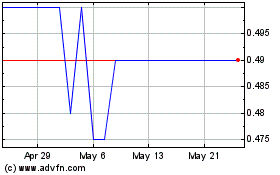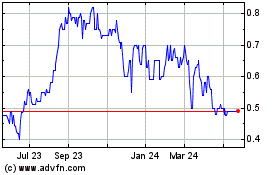Cynapsus Announces No Buccal Mucosal Irritation in FDA Registration Study of APL-130277 for Parkinson's Disease
14 May 2014 - 8:00PM
Marketwired
Cynapsus Announces No Buccal Mucosal Irritation in FDA Registration
Study of APL-130277 for Parkinson's Disease
TORONTO, ONTARIO--(Marketwired - May 14, 2014) - Cynapsus
Therapeutics Inc. (TSX-VENTURE:CTH)(OTCQX:CYNAF), a specialty
pharmaceutical company, today announced no irritation was observed
when testing the APL-130277 sublingual apomorphine formulation in a
buccal mucosal irritation model in hamsters, either macroscopically
(clinician observation of oral cavity) or microscopically. The
study was conducted in compliance with the Good Laboratory Practice
for Nonclinical Laboratory Studies of the United States Food and
Drug Administration ("FDA"), 21 CFR Part 58, and OECD Principles of
Good Laboratory Practice (OECD, 1998).
APL-130277 is an easy-to-administer, fast-acting and proprietary
reformulation of apomorphine for sublingual delivery. Injectable
apomorphine is the only approved drug in the United States, Europe,
Japan and other countries for the acute rescue of "off" motor
symptoms of Parkinson's disease. The APL-130277 thin film strip
system technology is specifically designed to provide enhanced
convenience and eliminate buccal mucosal irritation, among other
attributes.
Mr. Anthony Giovinazzo, President and CEO of Cynapsus commented:
"The data, coupled with our clinical results to date, continues to
validate the design of our thin-film strip technology. Since we
started the development of APL-130277, we have been aware of the
possibility of buccal mucosa irritation with extended use, so we
determined it was prudent to complete this irritation study sooner
rather than later. This study is also a required registration study
by the FDA. We are encouraged with the results, and look forward to
demonstrating similar results in upcoming human clinical trials
planned over the next 24 months. This study provides evidence that
APL-130277 may provide therapeutic levels of apomorphine dosing
with low or no irritation when used by Parkinson's patients
multiple times per day on a daily basis."
The APL-130277 strips have also been administered in
approximately 100 healthy human volunteers in single dose studies,
with no evidence of irritation.
About The Buccal Mucosal Irritation Model
In the study, three times each day for 28 consecutive days, an
equal number of placebo and apomorphine containing thin strips were
placed in the cheek of the animals. The dose used in the study was
significantly higher, on a relative weight adjusted basis, than
what would normally be given to patients. Care was taken to apply
the thin strips to the same region of each cheek pouch for every
dose application.
There was no external evidence of irritation based on clinical
evaluations of the cheek pouches during the study and at the end of
the 28 days of dosing.
In microscopic analysis there was no observed evidence of
irritation or inflammation.
About Apomorphine
Apomorphine, a potent dopamine agonist, is the only drug
approved specifically for the treatment of acute motor
fluctuations/hypomobility (freezing or "off" episodes) in patients
with advanced Parkinson's disease. Presently, apomorphine is
administered by intermittent subcutaneous injection usually via a
pre-filled injection pen, or, in some cases outside the United
States, by continuous infusion pump. Drawbacks associated with
subcutaneous injection therapy for patients and caregivers include
aversion to needles, the need for multiple injections, which can be
painful and are often associated with irritation and inflammation
at the injection site, and the requirement for a degree of manual
dexterity that some Parkinson's patients find difficult.
About Cynapsus Therapeutics
Cynapsus is a specialty pharmaceutical company developing a
convenient and easy to use sublingual (oral) thin film strip for
the acute rescue of "off" motor symptoms of Parkinson's disease.
Cynapsus' drug candidate, APL-130277, is an easy-to-administer,
fast-acting reformulation of apomorphine, which is the only
approved drug (in the United States, Europe, Japan and other
countries) to rescue patients from "off" episodes. Cynapsus is
focused on maximizing the value of APL-130277 by completing pivotal
studies in advance of a New Drug Application ("NDA") expected to be
submitted in 2016.
Over one million people in the U.S. and an estimated 4 to 6
million people globally suffer from Parkinson's disease.
Parkinson's disease is a chronic and progressive neurodegenerative
disease that impacts motor activity, and its prevalence is
increasing with the aging of the population. Based on a recent
study and the results of the Corporation's Global 500 Neurologists
Survey, it is estimated that between 25 percent and 50 percent of
patients experience "off" episodes in which they have impaired
movement or speaking capabilities. Current medications only control
the disease's symptoms, and most drugs become less effective over
time as the disease progresses.
More information about Cynapsus (TSX-VENTURE:CTH)(OTCQX:CYNAF)
is available at www.cynapsus.ca and at the System for Electronic
Document Analysis and Retrieval (SEDAR) at www.sedar.com.
Forward Looking Statements
This announcement contains "forward-looking statements" within
the meaning of applicable securities laws. Generally, these
forward-looking statements can be identified by the use of
forward-looking terminology such as "plans", "expects" or "does not
expect", "is expected", "budget", "scheduled", "estimates",
"forecasts", "intends", "anticipates" or "does not anticipate", or
"believes" or variations of such words and phrases or state that
certain actions, events or results "may", "could", "would", "might"
or "will be taken", "occur" or "be achieved". Forward-looking
statements are subject to known and unknown risks, uncertainties
and other factors that may cause the actual results, level of
activity, performance or achievements of Cynapsus to be materially
different from those expressed or implied by such forward-looking
statements, including but not limited to those risks and
uncertainties relating to Cynapsus' business disclosed under the
heading "Risk Factors" in its March 26, 2014, Annual Information
Form and its other filings with the various Canadian securities
regulators which are available online at www.sedar.com. Although
Cynapsus has attempted to identify important factors that could
cause actual results to differ materially from those contained in
forward-looking statements, there may be other factors that cause
results not to be as anticipated, estimated or intended. There can
be no assurance that such statements will prove to be accurate, as
actual results and future events could differ materially from those
anticipated in such statements. Accordingly, readers should not
place undue reliance on forward-looking statements. Cynapsus does
not undertake to update any forward-looking statements, except in
accordance with applicable securities laws.
Neither the TSX Venture Exchange nor the OTCQX International has
approved or disapproved the contents of this press release.
Cynapsus TherapeuticsAnthony GiovinazzoPresident and CEO(416)
703-2449 x225ajg@cynapsus.caCynapsus TherapeuticsAndrew WilliamsCOO
& CFO(416) 703-2449 x253awilliams@cynapsus.ca
Cotec (TSXV:CTH)
Historical Stock Chart
From Dec 2024 to Jan 2025

Cotec (TSXV:CTH)
Historical Stock Chart
From Jan 2024 to Jan 2025
